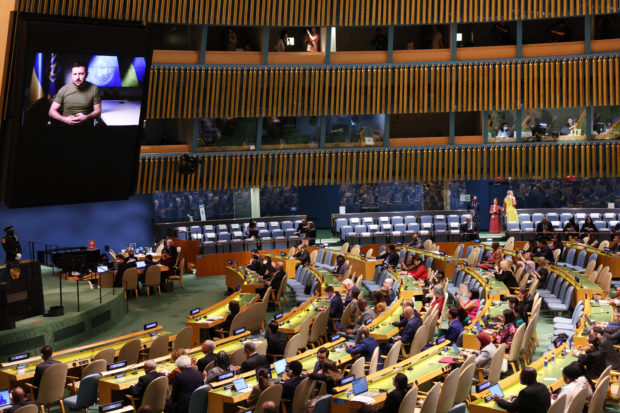Indonesia warns of global food insecurity

Ukrainian President Volodymyr Zelensky speaks to world leaders via a video link as they attend the 77th United Nations (UN) General Assembly which has returned in person this week for the first time in three years. Spencer Platt/Getty Images (North America)/AFP
JAKARTA – Indonesia has raised the alarm on a potential fertilizer shortage that could jeopardize the food security of billions of people worldwide, as tougher Russia sanctions are sought even amid fears of disastrous harvests next year.
The focus of the United Nations General Assembly (UNGA) this year has shifted from concerns over global health due to COVID-19 to food security, which many have singled out as a key topic to emerge from the conflict in Ukraine.
Even though the UN- and Turkey-led Black Sea Grain Initiative from July has helped dampen the soaring prices of Ukrainian grain and Russian fertilizer and get them out to global markets, there could be more at stake for the world if Western sanctions on Russia are left unchecked.
Ukraine is one of the world’s largest grain producers and the Russian invasion has sent global prices soaring. Moscow has cast blame on Western sanctions, an assertion denounced by Washington, which says it is not targeting agricultural or humanitarian goods, AFP reports.
One McKinsey study suggests that the war in Ukraine has resulted in declining global production of wheat by 15 million to 20 million tons in 2022 – and possibly up to 40 million tons in 2023. Meanwhile, experts warn that disruptions in fertilizer shipments could seriously impede future harvests worldwide.
Foreign Minister Retno LP Marsudi has warned that if the global community cannot prevent the issue of fertilizer scarcity from getting out of hand, then the outlook for global food security next year will become “bleak” and potentially wreak havoc on rice harvests.
“If because of fertilizer [shortages], rice harvest yields experience decline or crop failure, then the welfare of 2 billion people is at stake – the majority of whom are in Asia,” she told reporters in New York, the United States, on Tuesday.
Earlier that day, at the Global Food Security Summit (GFSS) cochaired by Indonesia, the US and several others, Retno called on all countries to be prudent in their actions so as not to exacerbate the food crisis.
“It is very unfortunate that conflict has made the world difficult to sit together, while concerted efforts and better policy coordination are needed to address this pressing issue,” she said in her remarks to the forum on the sidelines of the 77th UNGA.
At the end of the summit, global leaders issued a declaration calling for urgent efforts to address global food insecurity, laying out seven specific lines of action.
Among them is an acknowledgment of the need to “keep food, fertilizer and agricultural markets open and avoid unjustified restrictive measures, such as export bans on food and fertilizer, which increase market volatility and threaten food security and nutrition at a global scale”.
Retno said she had persuaded the US side to include the points specific to fertilizer in the declaration.
Appearing by video link was Ukraine’s President Volodymyr Zelensky, who directly accused Moscow of willingly triggering a food crisis.
In his speech to kick off the UNGA general debate on Tuesday, UN Secretary-General Antonio Guterres also put the focus on the current global fertilizer market crunch.
He said that food supply could become a global problem next year if the fertilizer market was not stabilized.
“It is essential to continue removing all remaining obstacles to the export of Russian fertilizers and their ingredients, including ammonia,” the UN chief asserted.
“These products are not subject to sanctions – and we will keep up our efforts to eliminate indirect effects.”
Facing the threat of inflation and recovering from COVID-19, Western countries should tread with utmost care if they so decide to intensify sanctions, said experts.
“Sanctions that coercively disrupt [global] market prices are outside of international relations norms. We ought to respect the market mechanism of supply and demand,” Fajar B. Hirawan, an economist at the Centre for Strategic and International Studies (CSIS) said on Wednesday.
In the case of Indonesia, the monsoon season was mostly unaffected by climate change and still allowed for a sufficient yield of crops, Fajar noted. Even so, sanctions that were too intrusive might be injurious to the global supply chain and could potentially harm access to food in other ways like inflation, he said.
[Economic] noninterference is the keyword here. We are all dependent on each other, like it or not. The global value chain is closely knitted to the logistic sectors,” he warned.
“The Western countries are already faced with rocketing inflation, and climate change has made them drier. [Their policies] have already turned into a boomerang for them.”